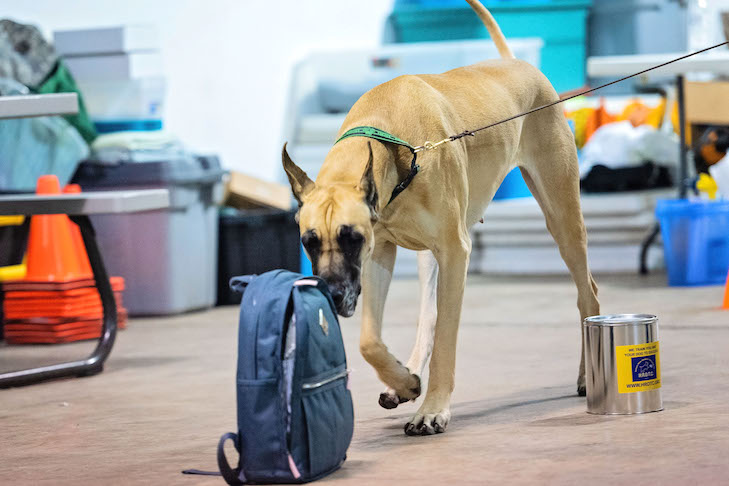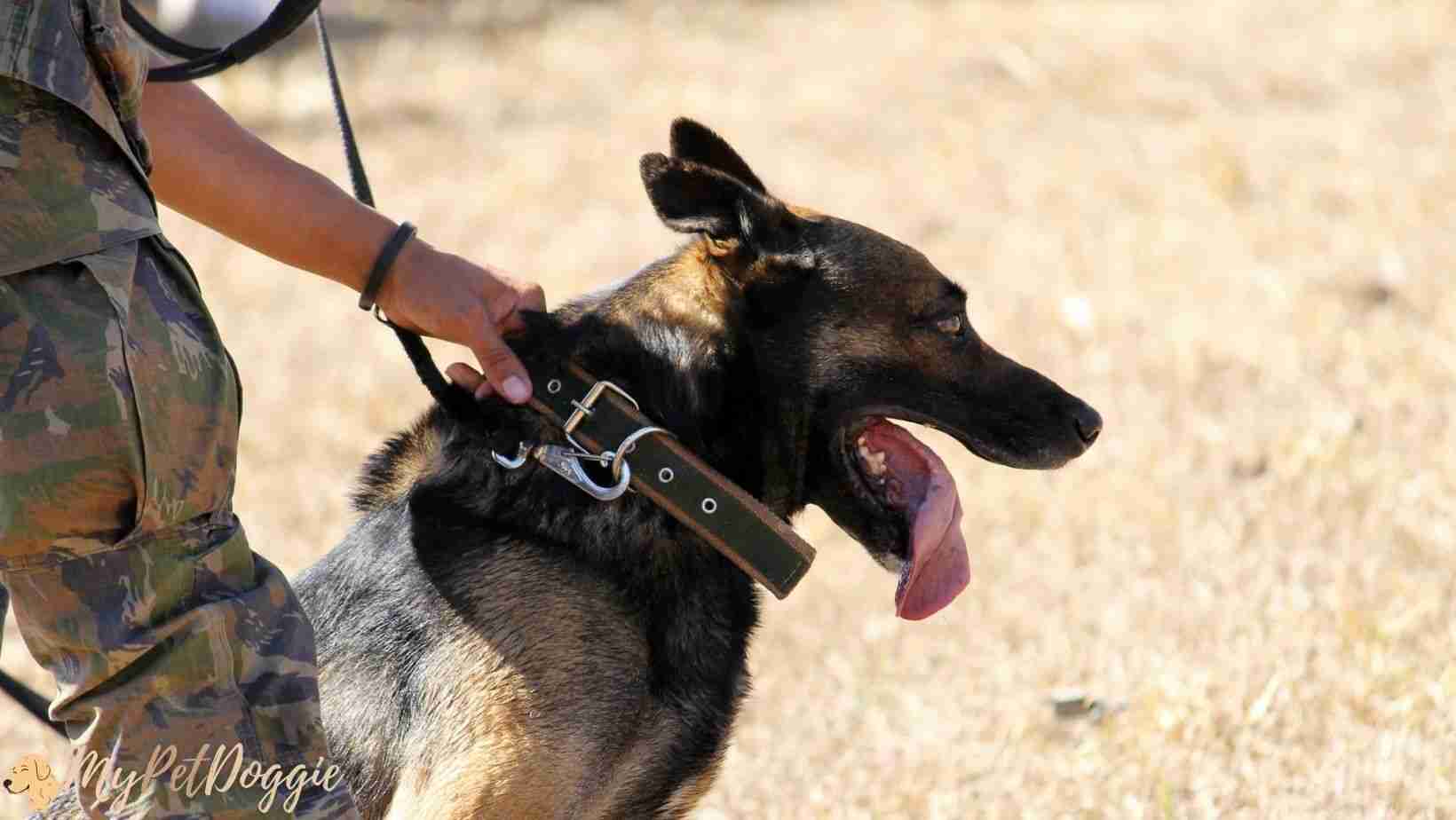About the Author: Introducing Dr. Adriana Luis, our Senior Content Editor at MyPetDoggie and also Veterinarian (MVZ). Kerry devotes most of her time to penning enlightening pieces about pet health, providing invaluable knowledge to pet owners globally. As the director of our Veterinary Content Team, she ensures the accuracy and comprehensiveness of our content, thereby making pet care accessible and understandable for everyone.
As someone who has owned dogs throughout his life, it is evident to me that dogs indeed are a smart breed.
They are not only obedient and emotionally intelligent, they also possess problem-solving skills.
But has it ever crossed your mind that you can actually measure a dog’s intelligence? That’s exactly what we are going to do in this article.
Some dog breeds have genetically greater reasoning skills that pass onto the generations.
It would be safe to say that they were developed to be working dogs. They have a history of gathering livestock, safeguarding their homes and hunting birds.
Indeed, all this work requires more intelligence than those breeds that are developed to be just companions.
Keep scrolling to learn more about what is the average IQ of a dog with some research-based studies. Also, you will learn about the dog breed with the highest and lowest IQs and much more.

What Is The Average IQ of a Dog?
So, what is the average IQ of a dog?
Studies show that the average IQ of a dog is about 100 and is the same as a 2-3-year old human.
100 is used to represent the average IQ of each species. If you score 100 in your IQ test, it means you are as intelligent as an average person.
And if the dog has an IQ level of 100, it showcases that they have an IQ the same as an average dog and they are as smart as a 2-year old person.
A score above 100 is considered more smart than the average.
The research includes how many words a dog can learn in comparison with a toddler. Generally, dogs can learn an average of 165 words which is somewhat similar to what a 2-year old can learn.
However, the intelligence of dogs varies in every breed– some are smarter than the other and family history contributes to it as well.
Also, the emotional intelligence and maturity of dogs is similar to much older people and the emotional bonding they share with their owners is also praise-worthy.
Which Dogs Have the Highest IQs?
The neuropsychologist, Stanley Coren emphasizes in his top-selling book, The Intelligence of Dogs, that how you train your dog ultimately marks the level of their intellect.
The American Kennel Club has given the following list of dogs breeds with the highest and lowest IQs:
Border Collie
This breed is the world’s premier sheep herder, valued for its intellect, exceptional instincts, and working abilities.
This breed of dog is highly trainable with an exceptional work ethic. They have the quality of being obedient, and agile with excellent problem-solving skills.
For the above-given qualities, they become a great option for working dogs in the line of work like law enforcement or search and rescue.

Poodle
Poodles are another breed that is exceptionally intelligent and active. Developed to collect items from the water.
Their excellent memory and learning skills make them stand out. Since they are highly trainable, you can train them for a variety of tasks like guiding, hunting or therapy dogs.
If you have any kind of allergies, these might be the best option for you as they have hypoallergenic coats.

German Shepherd
The world’s top police, guard, and military dog, as well as a devoted family friend and herder–the German Shepherd breed is well-known for its intelligence.
Alongside having strong work ethics and highly trainable skills, they are also popular for their loyalty and make for the best family pets.

Golden Retriever
Smart and willing to please. Bred as a hunting companion; excellent as a guide and in search-and-rescue missions.
Their eager-to-please nature makes them a perfect choice for pet dogs. Also, they have a friendly and outgoing nature.
They are often used as therapy, guide, and search and rescue dogs.

Doberman Pinscher
It’s famous for its endurance and speed. They are in high demand as police and army dogs because they were bred to be guard dogs.
This breed of dog is smart, loyal, and trainable and is often used as police and military dogs, as well as in search and rescue operations. They are devoted to their families and make good protection dogs.

You might be interested in: Learn about whether dogs can use cat litter and how to manage their bathroom habits
Which Dogs Have the Lowest IQs?
To label a breed of dog as dumb or intelligent might be too simplistic an approach to categorize them. In my opinion, good and consistent training makes a smarter dog.
Over my experience with training dogs, one thing that I have noticed is that the better I train them, the smarter they become.
Nevertheless, the dogs who are known to have the lowest IQs are:
- Basset Hound
- Bulldog
- Afghan Hound
- Bloodhound
- Beagle
- Mastiff
- Shih Tzu

How Dogs Show Their Intelligence
After learning about the average IQ of a dog, if you are wondering whether your dog is smart enough, look up for these signs:

Curiosity
The first and perhaps the most important sign of being intelligent is curiosity.
If your dog peeks into containers to see what’s inside it, or climbs on the other side of a barrier to explore what’s over there then he is one of a kind.
Smart dogs have a curious and impertinent nature to find out the sources of noise, to find out what things taste like and so on. They have an inquisitive mind and like to explore their surroundings.
Sharp observation skills.
Intelligent dogs observe your face expressions and body language. They are also aware of your moods and if they observe other dogs getting rewards for certain actions, they try to copy the same.
They also listen to your conversation carefully and try to pick up words.
Fast learning
Another quality of smart dogs is that they quickly understand new words and behaviors– smart dogs remember.
They have a solid memory and when you show them something a few times, they get it. Once they have learned something, you won’t have to repeat over and over again.
Flexibility.
Another thing I have noticed in smart dogs is that they are flexible. If they are stuck over something, they try new ideas and techniques and come up with something that works.
And what are the signs of not-so-smart dogs? Look for these signs to better differentiate between the two:
Contentment
The not-so-smart dogs are generally satisfied with their current circumstances. When you give them a new object or take them to a new place, they are not keen on exploring it.
All-in-all, they are not curious in nature.
Limited observation skills
Not-so-smart dogs do not pay heed to your body language and face expression. They are oblivious to your moods and don’t learn from observation.
Even if you reward another pet in front of them, they won’t repeat the action unless you specifically show them. Additionally, they don’t pay attention to familiar words.
Slow learning
Not-so-smart dogs are slow-learners and you might need to repeat as more as 25 times to make them understand “sit” and “stay”
Short memory
Not-so-smart dogs keep forgetting what they learned unless you keep repeating it over and over again.
Fixed habits
Not-so-smart dogs lack both flexibility and creativity. They are stuck in the same thing and don’t try new and creative techniques to get out of it. Hence, they lack problem-solving skills.
Types of Dog Intelligence
Dogs show different kind of intelligence, some of the types of dog intelligence are listed below:

Adaptive intelligence:
This type of intelligence is directed towards the problem-solving skills of dogs and can be measured with IQ tests.
It is different in different dog breeds; some dogs will solve things in a matter of seconds while others will take a lot more time than normal.
The adaptive intelligence helps in activities like dog sport, hunting, puzzle toys and other such activities where dogs have to use their brain.
Instinctive intelligence:
The different types of dogs such as pet dogs, herding dogs, working dogs, implies that they have inherent ability to do specific tasks.
That is what instinctive intelligence is all about– the original breeding of a dog.
Working intelligence
How much a dog is capable of learning lies under this type of intelligence which is also known as obedience intelligence.
Working intelligence shows how quickly a dog obeys commands and adapts to new things.
Emotional Intelligence
Since dogs are social creatures, they naturally have high emotional intelligence and that’s why they can read and understand facial expressions and body languages of other creatures.
They are empathetic towards their owner and do better in a calm and peaceful environment.
You might be interested in: Discover the numerous health benefits of running with your dog for both you and your pet
How to Improve Your Dog’s IQ
Are you worried that your dog is not learning enough? Below I have handpicked some tips to keep your dog engaged and to boost their mood.
Follow these points and you are good to go:

Training and Tricks
You can’t expect a dog to act smartly if you don’t train them quite often.. By training them more, you are buying them more time to be mentally active.
It is a mutually beneficial situation where your dog gets to learn new things and it would be easier for you to handle them.
When first starting out with tricks, focus on your dog’s strengths and the activities you presently like doing together.
If your dog enjoys digging and pawing, teaching a high five, wave, or shake is a good place to start.
If your dog enjoys playing with balls, introduce games like soccer or basketball. Also, you can perform some tricks to motivate him to clean up their toys.
Obstacle And Agility Game
You can create your own obstacle games in your lounge where you can put pillows, chairs and other such stuff in the pathway.
Your dog will watch and try to jump over, This will not only benefit them physically but also mentally where they know where the obstacle is and how to overcome it.
Dog Toys
Try to buy your dogs some toys that they can engage in. One such example is the ring stacking where your dog has to put rings on the pole one by one.
It might seem difficult at first since dogs usually enjoy throwing and catching balls. But with positive training, your dog will surely get to enjoy these games.
Hide And Seek
You can hide your dog’s favorite toy and when he will learn about it, he will be curious to find it. He will look here and there and might do anything possible to get his favorite toy back.
Gift him some treats when he succeeds in finding his toy– this will boost him positively.
By giving this challenge to your dog, you would help your dog develop sharp-wittedness. Also, they will have fun which reduces their stress level.
Any similar trick would do if you think your dog is bored and you can;t take him out at the moment.
Puzzle games
Introduce some puzzle games to your dog’s activities. If you feel they are reluctant to play, try offering them some rewards to learn and obey tricks and commands.
Nothing motivates them better than to reward them with a treat after succeeding.
Clicker games
Another excellent activity to introduce in your dog’s activity is the clicker training. It uses positive reinforcement that you can deliver more precisely and quickly.
Let You Dog Sniff
The smelling sense of a dog is very strong
Your dog “sees” the world largely through his olfactory senses. The olfactory part of dogs that is responsible for scent processing is about 40% larger than that of a human.
Also, they contain up to 300 million scent receptors, compared to our six million.
When you go for a walk with your dog don’t just think about physical exercise, but consider mental stimulation as well.
Bring treats with you and cut them into small parts. Scatter them throughout the garden and let your dog sniff and find food by using a smelling sense.
Is it Better to Have a Smart Dog?
Smart dogs really do understand you and empathize with you. They are not only emotionally intelligent but also quick to learn, adapt, solve and obey.
But like everything, it has its drawbacks, like:
- The smart breed gets bored very easily and therefore you must train them with new things quite often.
- Smart dogs want to develop a close bond with you and are always after you. So, this might not be a good option for someone who likes privacy.
- They may also pick up bad habits quickly they learned from other dogs and you will find it difficult to handle.
Since obedience is considered as the intelligence of dogs, smart breeds are hard to train. Intelligent dogs don’t just follow commands blindly, rather they think of themselves first.
Though it is good quality, many owners don’t have patience for this. Add independence to it and your smart dog will end up being stubborn.
If you desire obedience, a people-pleasing dog with a good IQ will be a good choice because they have a natural desire to do so.
FAQs
Is cat IQ higher than dog?
At this point, it is inconclusive to say which one has a higher IQ.
What’s the highest IQ of a dog?
The highest IQ in dogs is not recorded yet but Border Collies record the highest IQ among dogs which is above average i.e. 100
Are dogs color blind?
Dogs have red-green color blindness
Who has a higher IQ, dogs or humans?
Humans have higher IQ and the average IQ of a dog is similar to that of a two-year-human.
How smart is a husky?
Husky is included in averagely intelligent dogs, ranking 74th out of 138 dog breeds.
Conclusion
Now you know what the average IQ of a dog is!
There are several breeds of dogs known for their learning skills, friendly behavior, emotional intelligence and problem-solving skills
The Border Collie, Poodle, Doberman Pinscher, German Shepherd, and Golden Retriever, fall in these categories.
But keep in mind each dog has its own ability to learn and get trained– they come with their own set of weaknesses and strengths.
The key is to figure out how the dog is bred and how to train them properly.
Also, remember that intelligent dogs don’t always make the best pets and you will have to choose the breed that suits your lifestyle.
References
https://www.apa.org/news/press/releases/2009/08/dogs-think#:~:text=According%20to%20server%20 behavioral%20 measures,age%202%20to%202.5%20years.&text=As%20for%20language%2C%20the%20average,learn%20250%20 words%2C%20 Coren%20 says.
https://pets.webmd.com/dogs/guide/choosing-doggie-daycares-and-kennels






